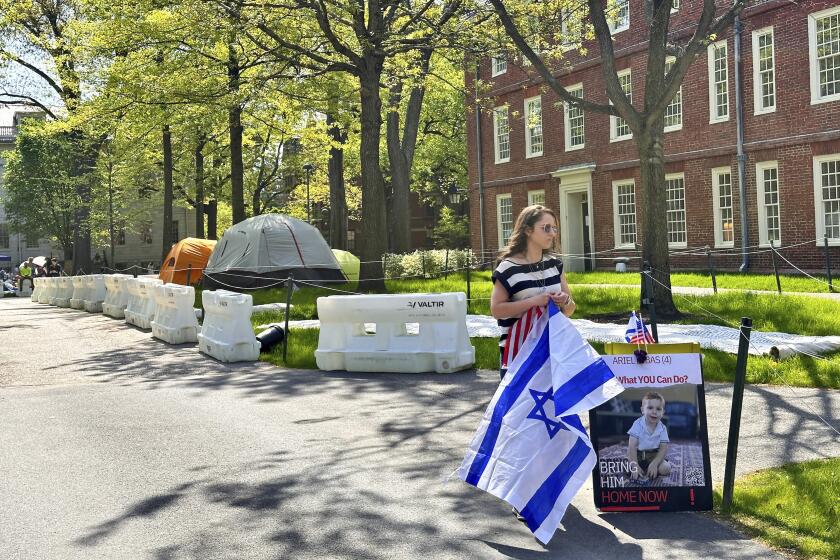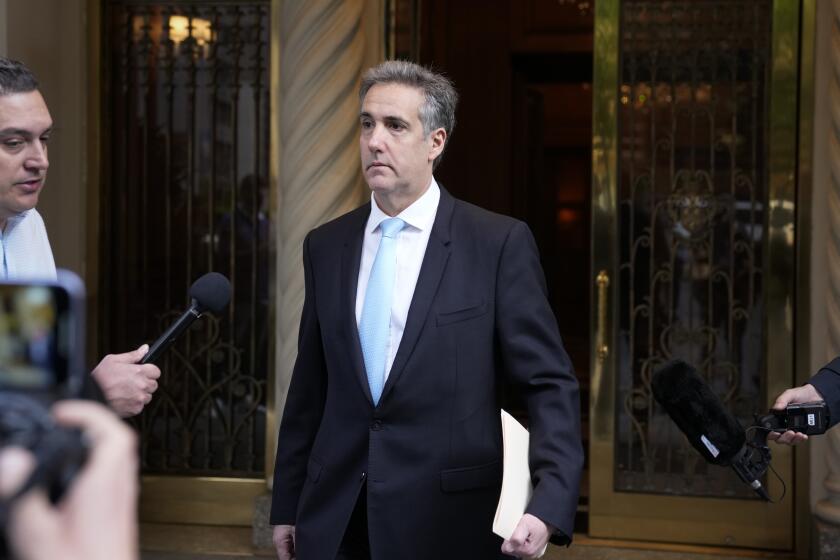Japan Mounts Crackdown on Mob No. 1
Gangland warfare that has split Japan’s biggest crime syndicate triggered a massive police crackdown Monday aimed at crippling the infamous Yamaguchi gang.
Armed with 32 arrest warrants and a new law that gives police greater powers to fight organized crime, about 1,300 Osaka police officers raided at least 204 suspected mob offices in western Japan, police said. Twelve people were arrested, police said.
Japanese media called the sweep the largest anti- gang operation ever mounted in the Osaka region, which is the nerve center of Japan’s underworld.
The raids follow the Aug. 28 slaying of Masaru Takumi, No. 2 leader of the 18,000-member Yamaguchi gang, the dominant force in Japanese organized crime. That gun attack in a Kobe hotel coffee shop--which also took the life of a 69-year-old dentist at a nearby table--triggered a wave of shootings that police say marks a battle between supporters and enemies of the dead leader.
Police said they feared the intra-gang violence was about to escalate. “We are taking preventive measures against an expected increase in shootouts as the 49-day mourning period for Masaru Takumi ends this week,” a police spokesman said.
A revised Anti-Organized-Crime Law took effect Oct. 1, boosting police power to fight the mob. It includes provisions--such as proof of participation in inter-gang violence--making it easier for police to shut down gang offices.
In Japan, major crime syndicates function openly as organizations with clearly marked offices and top leaders who hand out name cards identifying their gang and their position in it. Actions that are clearly criminal are carried out by underlings rather than the mob bosses. Japan has no anti-racketeering laws that would enable police to simply shut the syndicates down, and wiretapping--a common means of gathering evidence against gangsters elsewhere--is not allowed here.
*
But the combination of the new law and the strife within the Yamaguchi gang has given police an opportunity to close gang offices and show a toughened stance toward gang activities, said Raisuke Miyawaki, former head of the anti-organized-crime unit of the National Police Agency and now a private consultant.
“Police are trying to make a large number of arrests in order to make them even weaker,” Miyawaki said. “Of course, police are trying to arrest the suspects in Takumi’s killing. But they also are trying to suppress the Yamaguchi gang. . . . They are trying to arrest anyone close to the top.”
Organized-crime gangs have about 80,000 members in Japan, police estimate. They run a range of traditional activities, including gambling, extortion, prostitution and drugs. Over the past decade, they also have become increasingly entrenched in the legitimate economy, including real estate firms and the construction industry.
The roots of today’s gangs lie in organizations of professional gamblers, dishonest peddlers and street entertainers of feudal Japan. That history gave rise to a sometimes romantic view of gangsters as people who helped the weak and punished the strong, an image promoted after World War II by a popular genre of gangster films.
The postwar gangs absorbed juvenile delinquents and entered a wide range of criminal activities, consolidating into a few dominant crime families, the largest of which is the Yamaguchi gang. Since the early 1980s, Japanese authorities have made increasingly serious efforts to crack down on the gangs, with tougher laws and stepped-up police actions.
Pressure on the police to take forceful action has been stepped up by a string of revelations this year of racketeers blackmailing leading Japanese securities firms. These criminals specialize in extorting payments from legitimate businesses by threatening to disrupt stockholder meetings with either violence or embarrassing charges of wrongdoing directed at corporate executives.
Prosecutors charge that all four of Japan’s biggest brokerages have made illegal payoffs to alleged racketeer Ryuichi Koike, who is currently imprisoned. Ten executives or former executives at two leading firms, Nomura Securities Co. and Yamaichi Securities Co., have been arrested in the scandal.
Yamaichi executive Koichiro Tarutani, who was a party to several dispute cases involving clients, was stabbed to death on a Tokyo street Aug. 14 by an unknown assailant. Then, on Saturday, Manae Okamura, 63, the wife of a lawyer hired by Yamaichi in some of the same cases, was found stabbed to death near the front door of her home.
*
While police have made no definitive links between those killings and organized crime, investigators are expected to examine the possibility of such a connection. Takumi, the slain Yamaguchi leader, had a reputation for involvement in corporate extortion.
*
Etsuko Kawase of The Times’ Tokyo Bureau contributed to this report.
More to Read
Start your day right
Sign up for Essential California for news, features and recommendations from the L.A. Times and beyond in your inbox six days a week.
You may occasionally receive promotional content from the Los Angeles Times.






